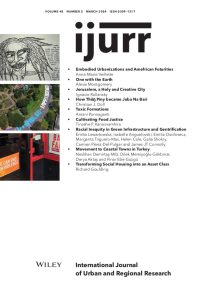This article assesses how the agency of international advisors can provide policy recommendations that, instead of introducing urban policy initiatives for multicultural encounters, sharpen political and spatial segregation within the context of ethnic conflict. The article explores the variegated nature of neoliberalization and argues that the adoption of strategic planning and creativity discourses enables the development of a sophisticated political rationale for governing ethnic diversity. The analysis focuses on a range of advisory practices—including the role played by Michael Porter at the Harvard Business School and Richard Florida at the Creative Class Group in advising former Jerusalem mayor Nir Barkat—in order to understand the dynamics of grounding imaginaries concerning a neoliberal role for the state and the depoliticization of the public sphere in a disputed city. By surveying official policy documents, journalistic interviews and two reports submitted by Porter and Florida to Barkat, the author examines how the branding of Jerusalem as a creative city involved managerial practices that classified the city’s diverse population according to categories of creative and non-creative labor rather than political subjects. The adoption of such discourses facilitated a novel approach for enhancing the state-building ethno-nationalistic project while at the same time reproducing the dynamics of occupation and annexation.
Details
Written by:
Ignacio Rullansky
Digital Object Identifier (DOI)
https://doi.org/10.1111/1468-2427.13219
About DOI

